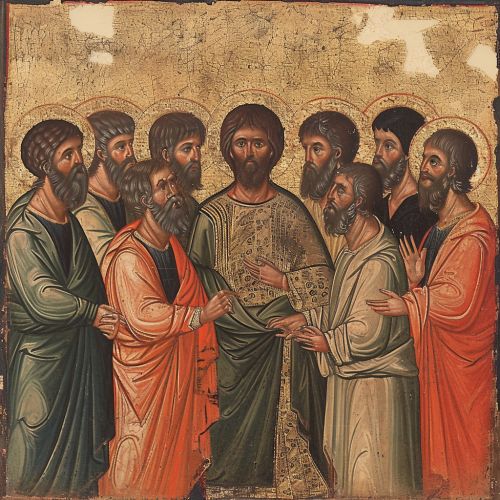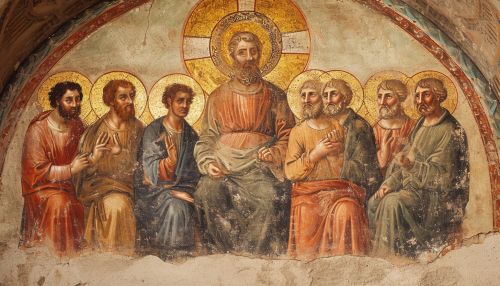Twelve Apostles
Origins and Calling of the Apostles
The term "Apostle" is derived from the Ancient Greek word "Apostolos", which means "one who is sent out". In the context of the New Testament, it refers to the twelve individuals whom Jesus Christ selected and commissioned to spread his teachings. These twelve individuals, known as the Twelve Apostles, played a crucial role in the establishment and spread of Christianity.
Jesus called his Apostles from various walks of life, predominantly from the lower socio-economic strata of society. The Apostles were fishermen, tax collectors, and political zealots, among others. This diverse group was united by their common belief in Jesus and his teachings. Jesus Christ's selection of these individuals underscored his message of inclusivity and the transformative power of faith.


The Twelve Apostles
The Twelve Apostles, as listed in the New Testament, are Peter, Andrew, James the son of Zebedee, John, Philip, Bartholomew, Matthew, Thomas, James the son of Alphaeus, Thaddaeus, Simon the Zealot, and Judas Iscariot, who was later replaced by Matthias.
Peter
Simon Peter, often simply referred to as Peter, was a fisherman from Bethsaida. He was the brother of Apostle Andrew and is considered the first Apostle called by Jesus. Peter is often depicted as the leader of the Apostles and is known for his strong faith and occasional doubts.
Andrew
Andrew, the brother of Peter, was also a fisherman. He was a disciple of John the Baptist before he followed Jesus. Andrew is credited with introducing his brother, Peter, to Jesus, highlighting his role as a connector and evangelist.
James, Son of Zebedee
James, often referred to as James the Greater, was a fisherman like Peter and Andrew. He was the brother of John, another Apostle. James and John were referred to by Jesus as "Boanerges," meaning "sons of thunder," possibly due to their fiery temperaments.
John
John, the brother of James, was also one of the first Apostles to be called by Jesus. He is traditionally considered the author of the Gospel of John, three Epistles of John, and the Book of Revelation.
Philip
Philip was from Bethsaida, the same town as Peter and Andrew. He is known for his approach of rational analysis and questioning, which is evident in various biblical accounts.
Bartholomew
Bartholomew, also known as Nathanael, was introduced to Jesus through Philip. He is known for his honesty and skepticism, as he initially doubted that the Messiah could come from Nazareth.
Matthew
Matthew, also known as Levi, was a tax collector, a profession looked down upon by society at the time. His background highlights the transformative power of Jesus' teachings, as he left his job to follow Jesus.
Thomas
Thomas, also known as Doubting Thomas, is known for questioning Jesus' resurrection until he saw Jesus' wounds. His story underscores the struggle with doubt within faith.
James, Son of Alphaeus
James, son of Alphaeus, also known as James the Less, is one of the lesser-known Apostles. He is often confused with James, son of Zebedee, and James, brother of Jesus.
Thaddaeus
Thaddaeus, also known as Lebbaeus or Judas son of James, is another lesser-known Apostle. He is often identified with Jude, one of the brothers of Jesus.
Simon the Zealot
Simon the Zealot, also known as Simon the Canaanite, was a political zealot. His inclusion among the Apostles shows the wide range of backgrounds and beliefs among Jesus' followers.
Judas Iscariot
Judas Iscariot is known for betraying Jesus. After his betrayal and subsequent death, he was replaced by Matthias.
Role and Significance of the Apostles
The Twelve Apostles were instrumental in establishing the Church and spreading Christianity. They served as the primary disciples of Jesus during his ministry and were witnesses to his teachings, miracles, death, and resurrection. After Jesus' ascension, the Apostles played a crucial role in the early Church, spreading the Gospel and establishing Christian communities throughout the Roman Empire.
The Apostles also contributed to the New Testament. The Gospels of Matthew and John were traditionally attributed to the Apostles of the same name. Peter and John are also traditionally considered the authors of several Epistles in the New Testament.
Legacy of the Apostles
The legacy of the Apostles continues to influence Christianity today. They are venerated as saints in various Christian denominations, and their teachings continue to guide Christian thought and practice. The Apostles' Creed, a statement of Christian faith, is traditionally attributed to the Apostles, symbolizing their foundational role in establishing Christian doctrine.
